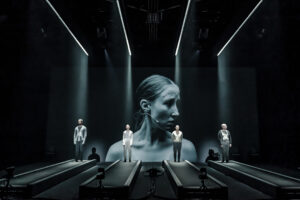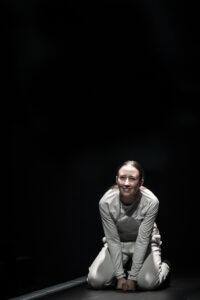Tinuke Craig brings concert version of The Color Purple alive
★★★★
 The Curve production of The Color Purple is billed as a concert version of their staged production from 2019 but that gives a false impression. The cast don’t just stand in a line and sing. They are in costumes, and with director Tinuke Craig at the helm again they move around and mime, so it feels staged and very well staged, I might say. It helps that it has a strong cast who can both sing and act.
The Curve production of The Color Purple is billed as a concert version of their staged production from 2019 but that gives a false impression. The cast don’t just stand in a line and sing. They are in costumes, and with director Tinuke Craig at the helm again they move around and mime, so it feels staged and very well staged, I might say. It helps that it has a strong cast who can both sing and act.
You might know the story, which is based on Alice Walker’s novel and Stephen Spielberg’s film, with a book by Marsha Norman. It centres on a black American woman in the early 20th century who suffers much abuse but eventually meets some strong women and finds love and self belief. As in the best musicals, the music which is written by Brenda Russell, Allee Willis & Stephen Bray tells the story.
What you essentially have in this production of the Color Purple is a fairly empty stage with the vast emptiness of the auditorium around it. But it feels far from empty. Thanks to Tinuke Craig’s direction, the stage is filled with characters from the central unassertive Celie to her abusive father and husband to the strong women who inspire her. And the cast move with purpose and vigour.
The lighting by Ben Cracknell is like an additional actor enhancing each time. Even the camera editing adds to the experience by cutting in time to the music, and a restrained use of the superimposition of one face upon another. You hardly notice the lack of touching in a musical in which physical contact- both abusive and loving- is actually an important part.
T’shan Williams is terrific as Celie. Before our eyes, she transforms from submissive to assertive, from doubt to confidence, while retaining an essential gentleness. And it is a joy to see her change from someone who describes sex as like her husband is going to the toilet on her and whom he undermines with the description ‘you black, you poor, you ugly and you a woman’. It’s a great performance.
The music begins in a gospel style in which the horrors of her life seem to go hand-in-hand with the domination of the church. Then light breaks through as Shug arrives, a joyous performance by Carly Mercedes Dyer, and with her some lively blues. Shug reassures Celie with a showstopping song Too Beautiful For Words and shows her for the first time that life can be about love rather than suffering.
I’d like also to pick out Karen Mavundukure as the forceful and funny Sofia, Danielle Fiamanya as Celie’s heroic sister Nettie, and Ako Mitchell who plays Mister, the husband who begins as abusive but eventually sees the error of his ways, he being very much a product of society, and finds redemption.
I myself am not so interested in the questions raised about whether God is to be blamed or thanked for the situation the characters find themselves in, even if I do share his apparently favourite colour. Nevertheless, I was happy to be carried along by this ultimately uplifting musical.
The Color Purple has streamed at curveonline.com
Click here to watch this review on YouTube
Click here for Paul’s YouTube interview with the director of The Color Purple Tinuke Craig.

